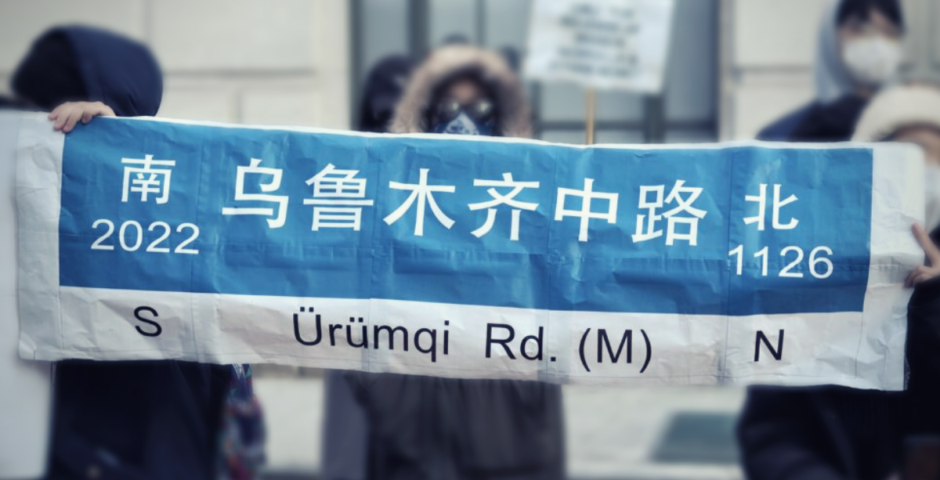
‘I refuse that narrative’: London students protest in front of the Chinese Embassy
‘It’s the first step in starting to build a democratic China’
The end of November saw China’s largest protests in decades after an apartment block fire killed 10 in the northwestern city of Urumqi.
People blamed the government’s strict “Zero-Covid” policies for the casualty, saying residents were prevented from escaping by the partial lockdown the building was under at the time of the fire. Their anger goes beyond this incident, however, since mass testing, long-term lockdowns, and mandatory central quarantines have disrupted the daily lives of people even past the height of the pandemic.
Protests also spread outside the country, including several in front of the Chinese Embassy in London over the past two weeks. Protesters chanted for President Xi Jinping to stand down, held banners calling for freedom and human rights in China, and sang Les Misérables’ Do You Hear the People Sing into the cold London night.
We spoke to some of the Chinese students taking part. They all had different reasons for joining and different hopes for what could be achieved, but they united in their opposition to the direction their country is going in.

Candles left to commemorate those killed in the Urumqi fire
A Chinese PhD student had been motivated to join her first-ever protest. She told The London Tab: “I mostly came because people are starting to protest in China. I’m outside. I have an obligation to stand with them.”
For her, China’s political system is not completely wrong. But while she agrees with China’s current constitution, she strongly opposes Chinese President Xi Jinping. She believes the situation in China is worsening under him and said: “My ultimate hope is for Xi Jinping to stand down.”
Since Xi came to power in 2012, China has seen increasing authoritarianism and tightening control. In October, he secured an unprecedented third five-year term after removing a two-term limit on power, giving him a chance to rule for life.

Other people attending the protests have gone further in their demands.
Simon, a Chinese student and a part of the International Socialists Alternative, has organised some of the protests. For him, the demonstrations are not just about Xi stepping down but towards building a truly democratic and socialist China.
He has been politically active for a while but said the protests in China at the end of November “changed [his] world,” considering how rare and difficult it is for people to voice their dissent publicly and on such a big scale.
“Seeing the people in Shanghai standing in the street shouting Xi Jinping step down – of course, it’s going to be stunning. Of course, it’s going to be amazing,” he said.

A sign with “freedom” written in Chinese
As exciting as it was seeing people protesting in the streets of Chinese cities, Simon recognised things would not change instantly. The most important question for him is what’s next because “that anger won’t go away.”
“We think this will continue even if they smash these protests. Three or four months down the line, something else will be a flashpoint and bring this back up.
“We have to get organised and have an open and frank debate about what the next steps are,” he said.

A protester holding a piece of plane A4 paper, which has become the symbol of the protests
A feminist attending a protest during International Human Rights Day told The London Tab: “I think it’s my duty to speak out – to do something of substance for my country and to stand with everyone suppressed by the Chinese Communist Party government.”
She also highlighted how the protest was not just for China’s majority Han Chinese population. “Today’s protest we are not just calling for freedom for China but other countries as well: for people in Hong Kong, Tibet, and East Turkestan.”
Another key point for her was the prominent role women had played in protests inside and outside of China. She gave an example of how the larger movement against governmental control – referred to as the “white paper revolution” or “A4 revolution” by some – was started by a single female student standing and holding a piece of plain A4 paper at her university in Nanjing, China.
“The movement and power of feminists are more dynamic than any nationalism. When I regard myself as a woman, I stand with women from around the world.
“I’m not just Chinese. I’m a woman.”

Like other protesters, she recognised the challenges ahead. To her, these protests are “the first step in starting to build a democratic China.”
She said: “I’m a little pessimistic about China’s future, but I really think something has changed. Everyone who thinks Chinese people can’t or don’t have the ability to build a democratic system is wrong. I refuse that narrative.”
Despite protesting in London, everyone interviewed was concerned about their safety and the safety of people close to them. Almost everyone attending protests in London wore masks to obscure their identity. No one interviewed wished to use their real name out of fear for their and their loved one’s safety, as there have been precedents of protesters outside of China being harassed.
Since the protests, the Chinese government has loosened the covid rules, removing most extreme restrictions and lockdowns. As a result, China is now amidst a massive coronavirus outbreak.
The London Tab contacted the Chinese Embassy in London for comment but did not receive a response at the time of publishing.
Related stories recommended by this writer:
• Students put up posters at Queen Mary in protest of Chinese President Xi Jinping
• ‘Unite and fight’: We spoke to students and staff at UCU’s ‘biggest ever strike rally’
• ‘We are here to support Freedom’: Thousands of Londoners march in solidarity with Ukraine









































